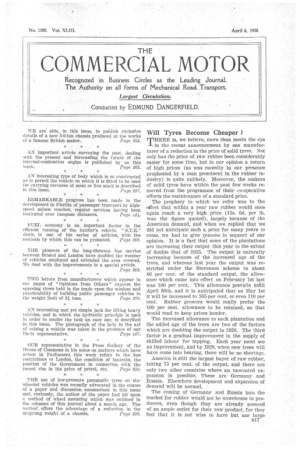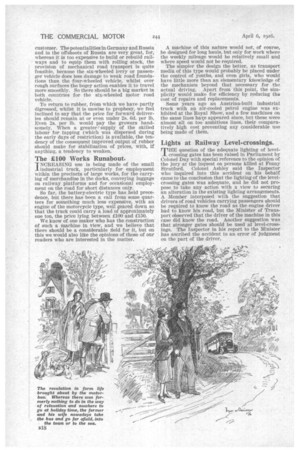Will Tyres Become Cheaper ?
Page 1

Page 2

If you've noticed an error in this article please click here to report it so we can fix it.
TERE is, we believe, more than meets the eye in the recent announcement by one manufacturer of a reduction in the price of solid tyres. Not only has the price of raw rubber been considerably easier for Some time, but in our opinion a return of high prices (as was recently in our presence prophesied by a Man prominent in the rubber industry) is quite unlikely. Moreover, the makers of solid tyres have within the past few weeks removed from the programme of their co-operative efforts the maintenance of a standard price.
• The prophecy to which we refer was to the effect that within a year raw rubber would once again reach a very high price (12s. 6d. per lb. was the figure quoted), largely because of the American demand, and when we replied that we did not anticipate such a price for many years to come, we had to give reasons in support of our opinion. It is a fact that some of the plantations are increasing their output this year to the extent of double that of 1925. The output Is naturally Increasing because of the increased age of the trees, and whereas last year the output was restricted under the Stevenson scheme to about 66 per cent, of the standard output, the allowance which came into effect on February 1st last was 100 per cent. This allowance prevails until April 30th, and it is anticipated that on May 1st it will be increased to 105 per cent, or even 110 per cent. Rubber growers would really prefer the 100 per cent. allowance to be retained, as that would tend to keep prices harder.
The increased allowance to each plantation and the added age of the trees are two of the factors which are doubling the output in 1926. The third factor is a gradual improvement in the supply of skilled labour for tapping. Each year must see an improvement, and by 1928, when new trees will have come into bearing, there will be no shortage.
America is still the largest buyer of raw rubber, taking 75 per cent. of the output, and there are only two other countries where an unwonted expansion is possible. These are Germany and Russia. Elsewhere development and expansion of demand will be normal.
The coming of Germany and Russia into the market for rubber would not be unwelcome to producers, even though they are already assured of an ample outlet for their raw product, for they feel that it is not wise to have but one large customer. The potentialities in Germany and Russia and in the offshoots of Russia are very great, for, whereas it is too expensive to build or rebuild railways and to equip them with rolling stock, the provision of mechanical road transport is quite feasible, because the six-wheeled lorry or passenger vehicle does less damage to weak road foundations than the four-wheeled vehicle, whilst over rough surfaces the bogey action enables it to travel more smoothly. So there should be a big market in both countries for the six-wheeled motor road vehicle.
To return to rubber, from which we havepartly digressed, whilst it is unwise to prophesy, we feel inclined to say that the price for forward deliveries should remain at or even under 2s. 6d. per lb. Even 2s. per lb. would pay the growers handsomely. When a greater.' supply of the skilled labour for tapping (which was dispersed during the early days of restriction) is available, the tendency of the consequent improved output of rubber should make for stabilization of prices, with, if anything, a tendency to weaken.
The £100 Works Runabout.
TNCREASING use is being made of the small _Lindustrial truck, particularly for employment within the precincts of large works, for the carrying of merchandise in the docks, conveying luggage on railway platforms and for occasional employment on the road for short distances only.
So far, the battery-electric type has held precedence, but there has been a call from some quarters for something much less expensive, with an engine of the motorcycle type, well geared down so that the truck could carry a load of approximately one ton, the price lying between L100 and £150.
We know of one maker who has the construction' of such a machine in view, and we believe that there should be a considerable field for it, but on this we would also like the opinions of those of our readers who are interested in the matter. A machine of this nature would not, of course, be designed for long hauls, but only for work where the weekly mileage would be relatively small and where speed would not be required.
The simpler the design the better, as transport media of this type would probably be placed under the control of youths, and even girls, who would have little more than an elementary knowledge of the mechanism beyond that necessary for the actual driving. Apart from this point, the simplicity would make for efficiency by reducing the cost of repairs and replacements.
Some years ago an Austrian-built industrial truck with an air-cooled petrol engine was exhibited at the Royal Show, and a few machines on the same lines hate appeared since, but these were almost all on too ambitious lines, their comparatively high cost preventing any considerable use being made of them.
Lights at Railway Level-crossings.
THE question of the adequate lighting of levelcrossing gates has been raised in Parliament by Colonel Day with special reference to the opinion of the jury at the inquest on persons killed at Fenny Stratford. Colonel Ashley said the Inspector who inquired into this accident on his behalf came to the conclusion that the lighting of the levelcrossing gates was adequate, and he did not propose to take any action with a view to securing an alteration in the existing lighting arrangements. A Member interposed with the suggestion that drivers of road vehicles carrying passengers should be required to know the road as the engine driver had to know his road, but the Minister of Transport observed that the driver of the machine in this case did know the road. Another suggestion was that stronger gates should be used at level-crossings. The Inspector in his report to the Minister has ascribed the accident to an error of judgment on the part of the driver.
































